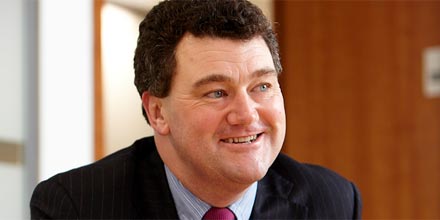
Royal London chief executive Phil Loney has said he would not have paid the £140 million figure for the Cofunds platform and indicated it would be ‘very challenging’ for Aegon to migrate the platform.
Earlier this month Aegon agreed to buy Cofunds from Legal & General (L&G) in a deal worth £140 million. As of 30 June Cofunds had £77.5 billion of assets under administration, while Aegon has £9 billion. Aegon also bought Blackrock’s defined contribution workplace platform earlier this year, meaning its total platform assets theoretically total around £98 billion.
Speaking with New Model Adviser®, Loney (pictured) said the deal will create difficulties for Aegon and some IFAs may look to switch platforms.
‘I personally wouldn’t have paid £140 million for Cofunds and I think it’s going to be really interesting to see how that goes for Aegon,’ he said.
When asked why he would not have paid that figure for Cofunds, Loney said that Cofunds is ‘quite a broken franchise’.
‘I think migrating Cofunds to a completely different technology will be very challenging. I’m, not saying Aegon won’t do it, but I’m sure that everyone in the market will be snipping away at the IFAs who are using Cofunds and saying “look you can come to us, it’s much easier and you don’t have to wait to see what happens to Aegon”.
‘I think it will be interesting to see how much of that business Aegon manages to hold onto and my impression is Aegon lost a fair bit of business when they switched their existing platform and started to move clients over, and it will be interesting to see if that happens again.’
In response to the comments, Mark Till, chief distribution and marketing officer at Aegon, said; ‘We’re not going to get into an open discussion on the merits of our strategy. Our focus is on ensuring advisers get the platform service they’re looking for.
‘We are constantly striving to improve the service we offer and this will be our focus throughout the integration. We are listening to advisers and will establish an advisory board which will take on board the feedback of advisers and inform the roadmap for the development of the platform.’
On the whole, however, Loney said the platform consolidation will be a positive for IFAs and customers and a smaller number of technologies is ‘good news in the long-term for cost efficiency in the sector’.
Ascentric delays
In December 2015 it was announced that Royal London’s wrap platform Ascentric upgrade will be delayed into 2016.
Loney said that this upgrade is still going on and has taken ‘a little bit longer than we first thought’.
‘But we just want to do a thorough job and make sure that when we do bring it to market it works really well. The whole idea around re-platforming is to improve scalability, the quality of service and the digital capabilities. We are happy with the way it’s progressing and it’s progressing broadly to plan.’
Loney said he could not say when the upgrade would be completed but indicated that the company has a date in mind.
Royal London is not the only firm to have experienced delays to its platform upgrades; Old Mutual Wealth has also seen the completion of its platform upgrade delayed from 2016 to 2018.
The Old Mutual platform revamp has also seen its costs for the upgrade rise dramatically, going from £160 million to an estimated £450 million, but this upgrade was defended by Old Mutual Wealth chief executive Paul Feeney who said the firm is tackling an issue while others are ‘kicking the can down the road’.
The Royal London upgrade was due to cost £3.9 million and when asked if this estimation has changed, the firm said it does not disclose individual project costs.
Switching employers
In Royal London’s results released this morning, the company’s group pensions business was up 66%, which it claimed was helped by employers switching providers.
Loney said he expects this trend to continue for some years to come and claimed the firm is in talks with about ‘90 employers’ who already auto-enrolled and are ‘looking around the market for opportunity to switch’ providers.
He said that this ‘secondary market’ in auto-enrolment represents an opportunity for advisers and that some advisers in the corporate space are already getting involved in it.
‘We are starting to see some advisers, particularly corporate advisers, starting to see a market in this and saying: “OK there are real opportunities to identify employers who aren’t happy, who may have gone direct and not involved an adviser in their original decision to auto-enrol, but are now willing to pay for some advice to find the best provider,” and there is a definite market there.’
Source: Citywire
